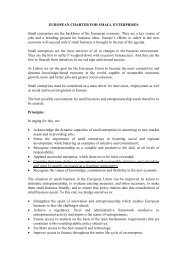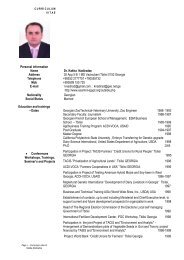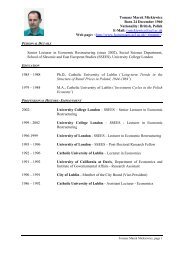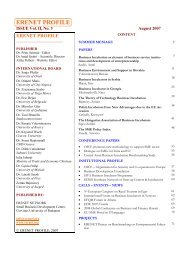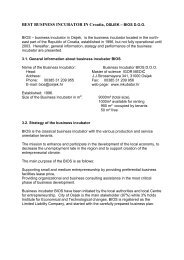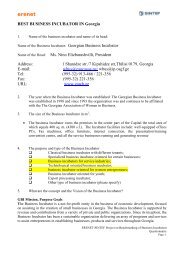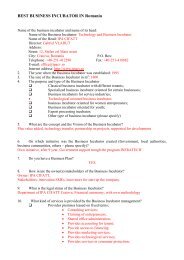Strategies of the Development of Entrepreneurship and SME
Strategies of the Development of Entrepreneurship and SME
Strategies of the Development of Entrepreneurship and SME
You also want an ePaper? Increase the reach of your titles
YUMPU automatically turns print PDFs into web optimized ePapers that Google loves.
The privatization process <strong>of</strong> objects under state control has an important place ineconomic reforms implemented in Azerbaijan during last years. One <strong>of</strong> <strong>the</strong> main changes ineconomic structure in <strong>the</strong> country during <strong>the</strong> transfer to market economy is <strong>the</strong> privatization<strong>and</strong> demonopolization <strong>of</strong> state property.It was considered to give <strong>the</strong> citizens 65% <strong>of</strong> property to be privatized free <strong>of</strong> charge at<strong>the</strong> result <strong>of</strong> application <strong>of</strong> measures envisaged in State Program on “Prizatization <strong>of</strong> stateproperty” accepted in 1995-1998.The privatization process acts as a solution <strong>of</strong> economic <strong>and</strong> financial problems <strong>of</strong> <strong>the</strong>country. The adoption <strong>of</strong> State Privatization Program in 2000 <strong>and</strong> opening <strong>of</strong> more than 400industrial enterprises for privatization in 2001 put <strong>the</strong> start <strong>of</strong> new stage in this importantprocess.Due to <strong>the</strong> figures from 01.07.2007 about 47,259 small enterprises, as well as 420industrial, 123 agricultural, 543 construction, 10thous<strong>and</strong> consumer services, 3,780 trade,1,081 public catering, 19,737 trasport, 190 communal objects <strong>and</strong> enterprises, 665 petrolstations, 10,143 o<strong>the</strong>r state objects <strong>and</strong> equipments were privatized in <strong>the</strong> republic <strong>and</strong> <strong>the</strong>total value <strong>of</strong> privatized enterprises was 194.9 mln. USD.The shares with value <strong>of</strong> USD 2,409,000 <strong>and</strong> USD 4,235,500 were sold respectively inclose auctions to <strong>the</strong> labor collectives <strong>and</strong> paid auctions. But, <strong>the</strong> shares with <strong>the</strong> value <strong>of</strong> 18, 8thous<strong>and</strong> USD were remained under state property. 40% <strong>of</strong> privatized enterprises <strong>and</strong> objectswere situated in Baku, 50% in o<strong>the</strong>r cities <strong>and</strong> regions <strong>of</strong> <strong>the</strong> republic <strong>and</strong> 10% in NakhchivanAutonomous Republic.About 1,500 joint – stock companies were established on <strong>the</strong> bases <strong>of</strong> state enterprises<strong>and</strong> afterwards were privatized. Due to <strong>the</strong> figures from 01.01.2007 5 enterprises <strong>of</strong>established joint – stock companies belonged to industrial sector, 2 enterprises belonged toagrarian-industrial complex, 1 enterprises to construction, 1 to transport, 3 to service <strong>and</strong>o<strong>the</strong>r sectors. 40% <strong>of</strong> joint-stock companies were established on <strong>the</strong> bases <strong>of</strong> state enterprisessituated in Baki, 60% in o<strong>the</strong>r cities <strong>and</strong> regions <strong>of</strong> <strong>the</strong> republic. At <strong>the</strong> beginning <strong>of</strong> <strong>the</strong> currentyear <strong>the</strong> shares <strong>of</strong> 104 joint-stock companies with <strong>the</strong> total value <strong>of</strong> USD 38 million wassubmitted to <strong>the</strong> auction <strong>and</strong> shares with <strong>the</strong> value <strong>of</strong> USD 6.7 million were sold. USD 23.5million was included into <strong>the</strong> state budget from <strong>the</strong> privatization process <strong>and</strong> USD 3.2 millionfrom rent <strong>of</strong> state property in 2007.At <strong>the</strong> same time 35 state enterprises with <strong>the</strong> share capital <strong>of</strong> USD 6.7 million, as wellas 18 construction, 6 industrial, 3 trade, 3 transport, 1 consumer service <strong>and</strong> 4 o<strong>the</strong>renterprises became a joint-stock companies.One <strong>of</strong> <strong>the</strong> most important issues in privatization process is support, restructurization<strong>and</strong> recovery <strong>of</strong> <strong>the</strong> activity <strong>of</strong> privatized enterprises. The measures to be taken in this field are<strong>the</strong> privileges in tax, credit, custom payments, <strong>and</strong> protection <strong>of</strong> market <strong>and</strong> producers fromunfair competition <strong>and</strong> monopolization. The carried analyses show that a lot <strong>of</strong> privatizedenterprises couldn’t survive after <strong>the</strong>ir privatization because <strong>of</strong> unsufficient support from <strong>the</strong>state, unfair competition, lack <strong>of</strong> financial resources, etc. Especially, processing <strong>and</strong> productionoriented enterprises, producers <strong>of</strong> tinned products, wine-making, poultry keeping, food <strong>and</strong>light industry couldn’t obtained <strong>the</strong> necessary economic results. The problems such asunsufficient working capital <strong>of</strong> privatized enterprises, credit debts remained beforeprivatization, unprotection <strong>of</strong> interests <strong>of</strong> local producers created serious obstacles for <strong>the</strong>iractivity.The current stage <strong>of</strong> privatization process covers <strong>the</strong> enterprises related to <strong>the</strong> keysectors <strong>of</strong> <strong>the</strong> country economy. The privatization <strong>of</strong> small enterprises should be fully finished102



